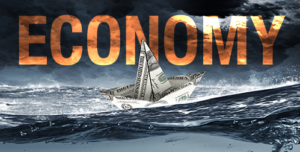- The International Monetary Fund warns of a ‘painful’ global economic slowdown
- Inflation, high interest rates, war and lingering pandemic effects are driving the slowdown
- The UN warns of an international debt crisis caused by central bank policies
IMF Forecasts Global Recession
In its most recent report, the International Monetary Fund warned that “the worst is yet to come, and for many people 2023 will feel like a recession.” They downgraded its forecast for the global economy due to several factors. A primary one is the worldwide shift to high interest rates to fight inflation. The IMF highlighted that the risk of financial policy “miscalibration” had “risen sharply.” They said the world economy “remains historically fragile” and financial markets are “showing signs of stress.”1
The IMF called inflation “the most immediate threat to current and future prosperity.” They predict inflation will peak this year. But it will stay elevated for a long time. Even as central banks fight to bring it down. Most central banks want to lower inflation to 2%. They are doing so by aggressively raising interest rates. These rapid hikes are part of the threat to the global economy.2
Other causes of the global recession include Russia’s war on Ukraine, high inflation and China’s economic slowdown. The war in Ukraine continues to “powerfully destabilize the global economy,” according to the report. It is driving up fuel and food prices around the world.
The IMF said there is a significant chance that global growth could fall below 2%. Compare that to the 6% seen in 2021. Global growth has fallen below 2% only five times since 1970. The IMF projects this to be the third weakest global economy since 2001. Only the 2008 financial crisis and the height of the pandemic were worse.3
“Next year is going to feel painful,” said Pierre-Olivier Gourinchas, the IMF’s chief economist. “There’s going to be a lot of slowdown and economic pain,” he said.4
The IMF downgraded the world’s major economies. The US is forecast to grow only 1.6% this year and just 1% in 2023. China has also been downgraded. Coronavirus is still slowing their economy. Their quickly deteriorating property sector is also dragging the country down.
The IMF followed its World Economic Outlook Report with its Global Financial Stability Report. That report said, “The global environment is fragile with storm clouds on the horizon.” And that policymakers around the world are facing an “unusually challenging financial stability environment.” Further shocks “may trigger market illiquidity, disorderly sell-offs, or distress.”5

The UN Also Issues a Warning
The IMF is not alone in its outlook. The World Bank issued a similar warning as did the UN. The United Nations Conference on Trade Development warned that central bank policies could do more damage to the global economy than the 2008 financial crisis or the pandemic.
The UN said that the world is “on the edge of a recession.” They predict Asian countries will be hit the hardest. The effects of collapsing Asian countries will ripple throughout the global economy. Higher interest rates and an increasingly stronger dollar could cause a massive debt crisis to boil over in South Asia and Western Asia.6
The IMF report concluded with a prediction, “As the global economy is headed for stormy waters, financial turmoil may well erupt, prompting investors to seek the protection of safe-haven investments.” The time to move your assets into a safe-haven is before the storm hits. Our Gold IRA can protect your assets from the worst of what’s yet to come. Contact us today to learn more.





